We did it. They did it. He did it.
Twenty-five days and 64 games later, the 2022 World Cup is over, Argentina are the champs, Lionel Messi finally did the only thing that he'd never done, and we all got to watch maybe the single greatest sports game ever played.
These tournaments are usually marathons, but this one -- with its condensed nature, in the middle of the European club season -- felt like both a marathon and a sprint. At one point, we got 11 straight days with four games a piece. Remember when Argentina lost to Saudi Arabia? Or the US drew with Wales? Me neither.
Anyway, Now that all the games have been played and we have a [checks notes, pulls out a magnifying glass, recoils in horror] one-week break until the Premier League comes back, let's take a 500-foot view of everything that just happened in Qatar. Here are the 13 stats that explain the 2022 World Cup.
"400 to 500 or more"
That's the number of migrant worker deaths that occurred during World Cup-related building projects in Qatar, according to the Secretary General of the Qatar World Cup Supreme Committee, Hassan Al Thawadi. Last year, the Guardian reported that 6,500 migrant workers had died in Qatar since it won the right to host the World Cup. Those aren't strictly World Cup-related deaths, but it feels crude and cruel to even try to distinguish between the two. Whatever the number, it's too high.
A World Cup, of course, isn't worth even one life. And this one -- thrown together at hyper-speed in a tiny desert nation with a miniscule native population and almost no previously existing infrastructure -- was built on the backs of hundreds of dead workers and countless more who lived and worked in truly inhuman conditions to make this tournament possible.
- World Cup news, features, previews, and more
- Stream FC Daily and Futbol Americas on ESPN+
We're going to make a hard right turn into the soccer stuff now, but we have to start here. Messi and Mbappe's greatness, Morocco's run, Christian Pulisic's star turn -- it all exists not in parallel, but in direct connection to the lost lives of all the people hurt by FIFA's decision to hold the World Cup in Qatar. We can't -- and we shouldn't -- separate any of it.
Gabby Amado praises Cristiano Ronaldo for the impact he has had on Portuguese football after his World Cup dream ended at the hands of Morocco.
+6.74
Argentina leave Qatar not only as World Cup winners, but much more importantly, they leave with the best cumulative expected-goal differential of any team in the tournament. Through seven games, they produced an xG differential of plus-10.76. Through five games, Brazil are second with a plus-10.03 mark. And then in third, you've got Germany with the number above.
Of course, Germany played three games and got knocked out in the group stages. After a half-century of seeming inevitability, the Germans have shown even they are not immune to the vagaries of a bouncing ball. They're probably one of the three to five best national teams in the world -- FiveThirtyEight ranks them second -- but one of the things that makes this tournament so compelling is that even when a great team plays well, they're still at risk of going home early.
29.7
Belgium came into the tournament as the No. 2 team in the FIFA rankings, but the much more pertinent number regarded the average age of their squad. Weighted by minutes played, the site FBref put the Belgians as the oldest team in the tournament. France broke the so-called winner's curse, becoming the first defending champ to not get knocked out in the group stages since 2006.
The theory behind this trend is that when teams win, they feel indebted to the squad that won and then tend to hang on to too many of the same players four years later, when most of them are four years worse. Instead, with their best-ever finish in third in 2018, it seems like Roberto Martinez ran afoul of the rule instead.
Ale Moreno feels Lionel Messi has now eclipsed Diego Maradona after leading Argentina to a thrilling World Cup win vs. France.
+600, +625, +675
Japan had the weirdest World Cup I can remember. These were the five largest upsets of the tournament, per Caesars Sportsbook, with the winning team's odds listed:
Saudi Arabia over Argentina: +2500
Costa Rica over Japan: +675
Japan over Spain: +625
Japan over Germany: +600
While the wins over Spain and Germany both seemed incredibly unlikely, the loss to Costa Rica was an even bigger shock. Their fourth game, against Croatia, ended in penalties.
This Japan team was incapable of playing a normal game, and we'll forever love them for it.
24.5
While it's very easy to get lost in the specifics, fixate on individual moments and wonder what the coach could've done differently, I suggest that USMNT fans focus on the fundamentals. This team played England straight up, went undefeated across the group stage and then was very competitive against the Netherlands despite the lopsided scoreline in their 3-1 Round of 16 exit.
The USMNT met expectations -- if not exceeded them -- in Qatar, and the number listed above matters so much more than anything else that happened: Per FBref, the Americans were the youngest team at the tournament.
2,754
Across their four matches in Qatar, Spain completed 3,415 passes. More pertinently, 2,754 of those passes were either square or backward. Through the Round of 16, no other team had completed more than 2,364 passes ... total. Not unrelated: Spain scored zero goals against Morocco and then were eliminated in a shootout.
If only the goal was either behind or to the side of the penalty spot ...
0.39
Brazil allowed the fewest xG per game of any team in the tournament. These are all the shots they conceded in Qatar, sized by the xG values of each individual shot:
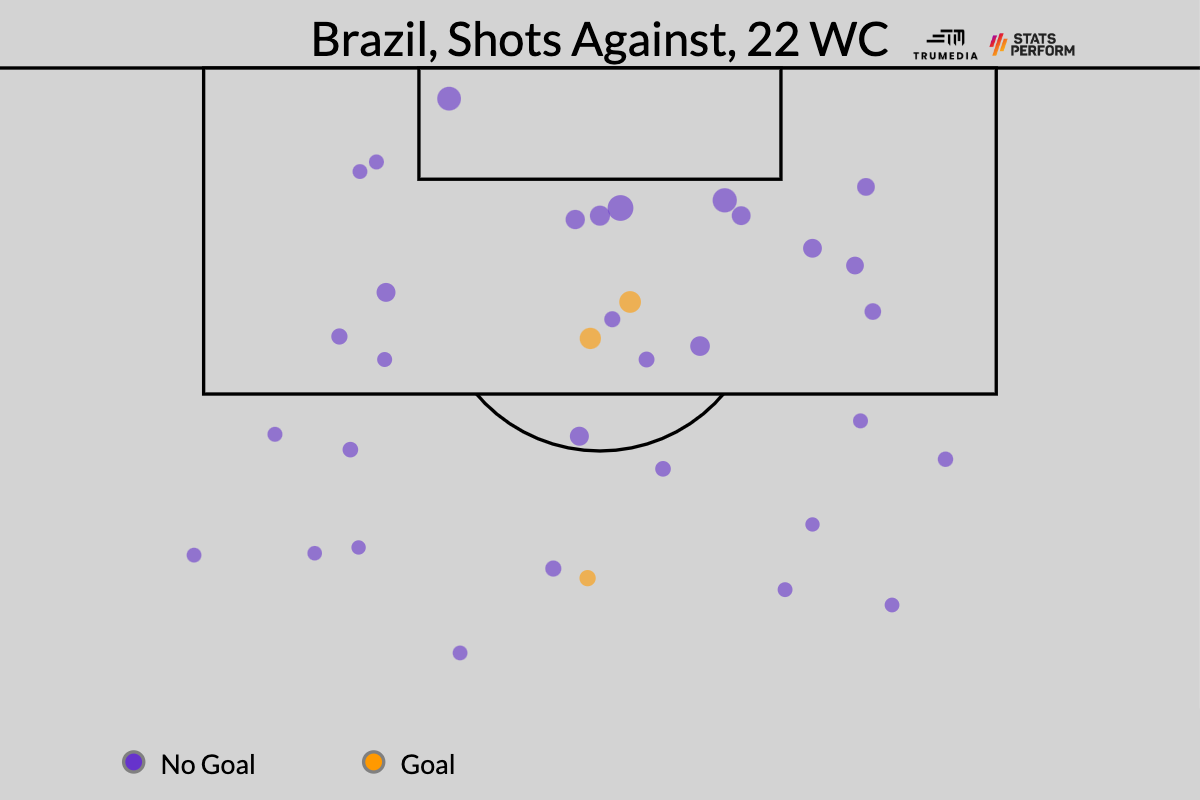
The biggest chance that led to a goal was in a meaningless group stage match against Cameroon, with almost a full team of Brazilian backups. As for the two goals that went in against their starter, Alisson? Both of them took massive deflections from shots outside the penalty area.
And yet somehow, that all added up to Brazil -- the team with Neymar and Vinicius Junior and Richarlison and all those other star attackers -- being eliminated in the quarterfinals.
Zero
Cristiano Ronaldo scored zero non-penalty goals for Portugal in Qatar:
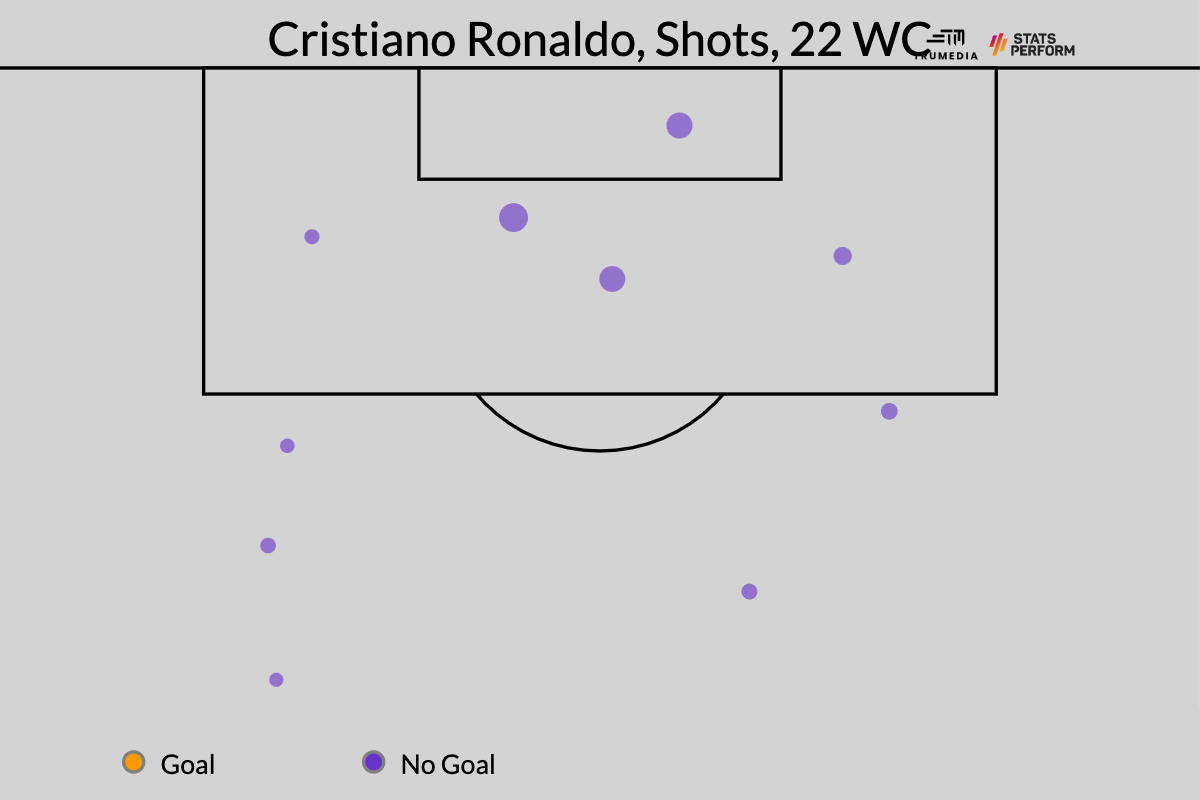
Unless he plays well into his 40s, he'll end his career without scoring a single goal in the knockout stages of the World Cup.
1
Despite a gigantic national complex regarding penalty shootouts, England players had missed zero in-game penalties coming into this tournament. They were 11-for-11, and then that number jumped up to 12 when Harry Kane evened the score to 1-1 against France in the quarterfinals.
With England then down 2-1 as Kane stepped up to take his second in-game penalty, history was on his side. Not just English history, but Harry Kane history -- he was 4-for-4 at the World Cup -- and World Cup history at large. Three previous players had attempted two penalties in a World Cup knockout game -- Fritz Walter for Germany in 1954, Eusebio for Portugal in 1966 and Gary Lineker for England in 1990 -- and all three converted both.
Kane, of course, smashed his second penalty over the crossbar, snapping all three streaks in the process. England lost 2-1.
The World Cup is cruel.
69
While it's still really difficult to truly quantify the value of midfield play, one of the clearest indicators of an effective midfield passer is the "progressive pass." FBref defines the stat as such: "Completed passes that move the ball towards the opponent's goal at least 10 yards from its furthest point in the last six passes, or any completed pass into the penalty area. Excludes passes from the defending 40% of the pitch."
At the 2022 World Cup, Croatia's 37-year-old Luka Modric competed 69 progressive passes -- 12 more than any other player:
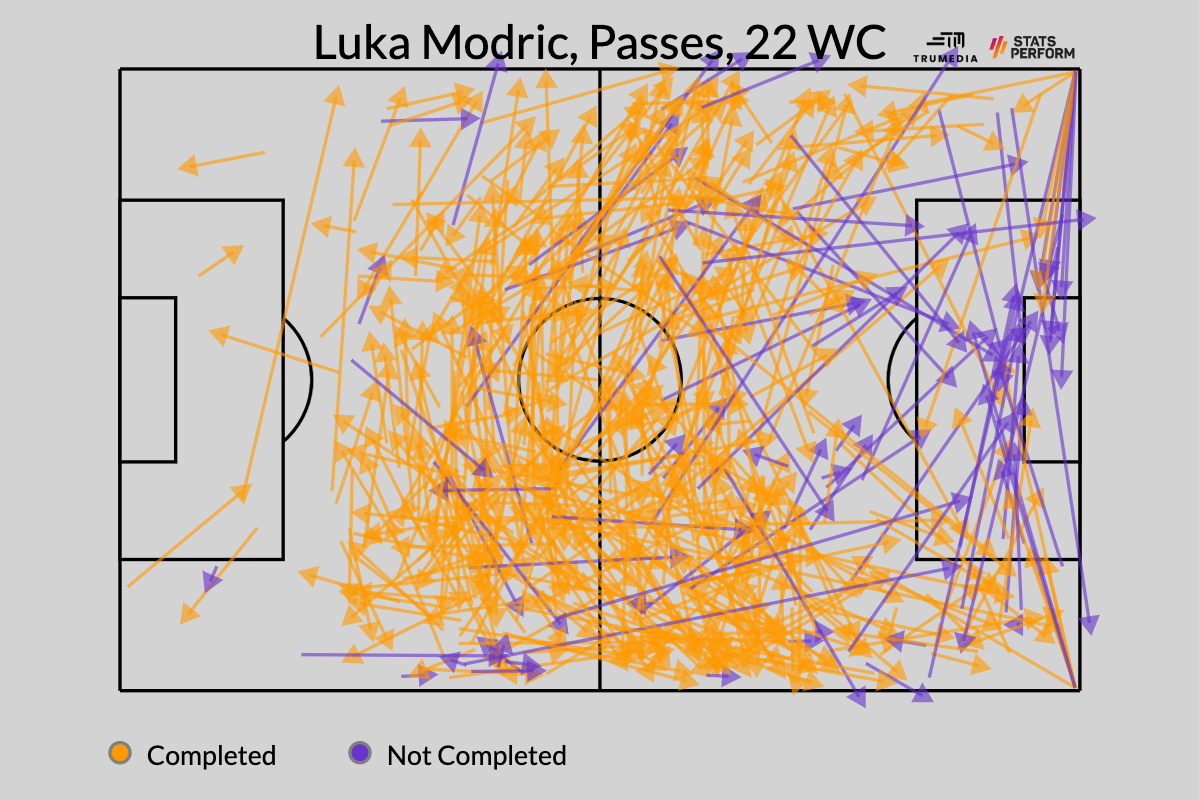
Modric also led all players in 2018 with 51 progressive passes. He won the Golden Ball -- and eventually the Ballon d'Or -- that year, though he might have been even better this time around.
2.19 and 1.66
The underdog's playbook has always been the same: defend deep, frustrate the more talented team with your defensive organization and then break forward at pace. Oh, and be good at set pieces.
After winning their group and then taking down Spain and Portugal in consecutive knockout rounds, Morocco became the first African team to reach the semifinals and capped off the best underdog run in World Cup history. They created more set-piece xG than any team other than France, and they moved the ball faster upfield (in meters per second) than all but two teams in the tournament:
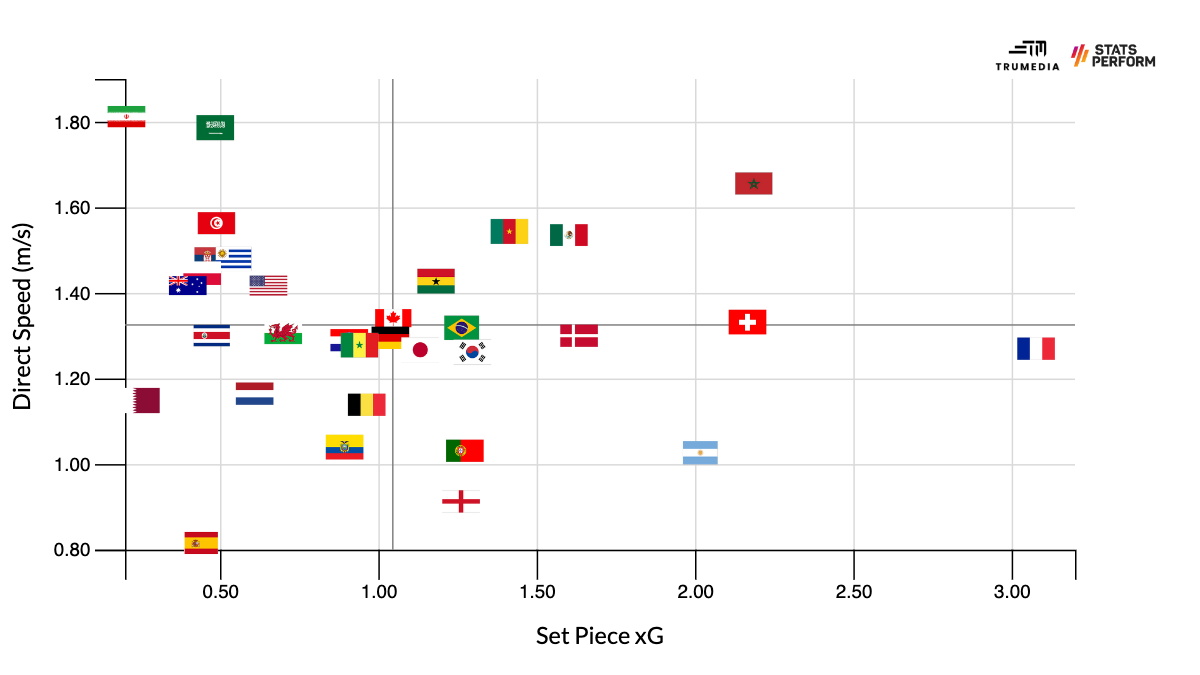
The major difference for Morocco, compared to previous underdogs from outside of Europe and South America? The players who did all that defending and counter-attacking and set-piece grinding play for the likes of Paris Saint-Germain, Chelsea, Fiorentina and Sevilla.
58
While he is absolutely electric when he does get the ball, most of Mbappe's impact comes without it. He might already be the best off-ball mover in the history of the sport -- running into open spaces on the counter, bursting into tight areas inside the penalty area and creating all kinds of room for his teammates with the threat all of that movement provides.
In Qatar, he received 58 progressive passes -- 18 more than any other player in the tournament:
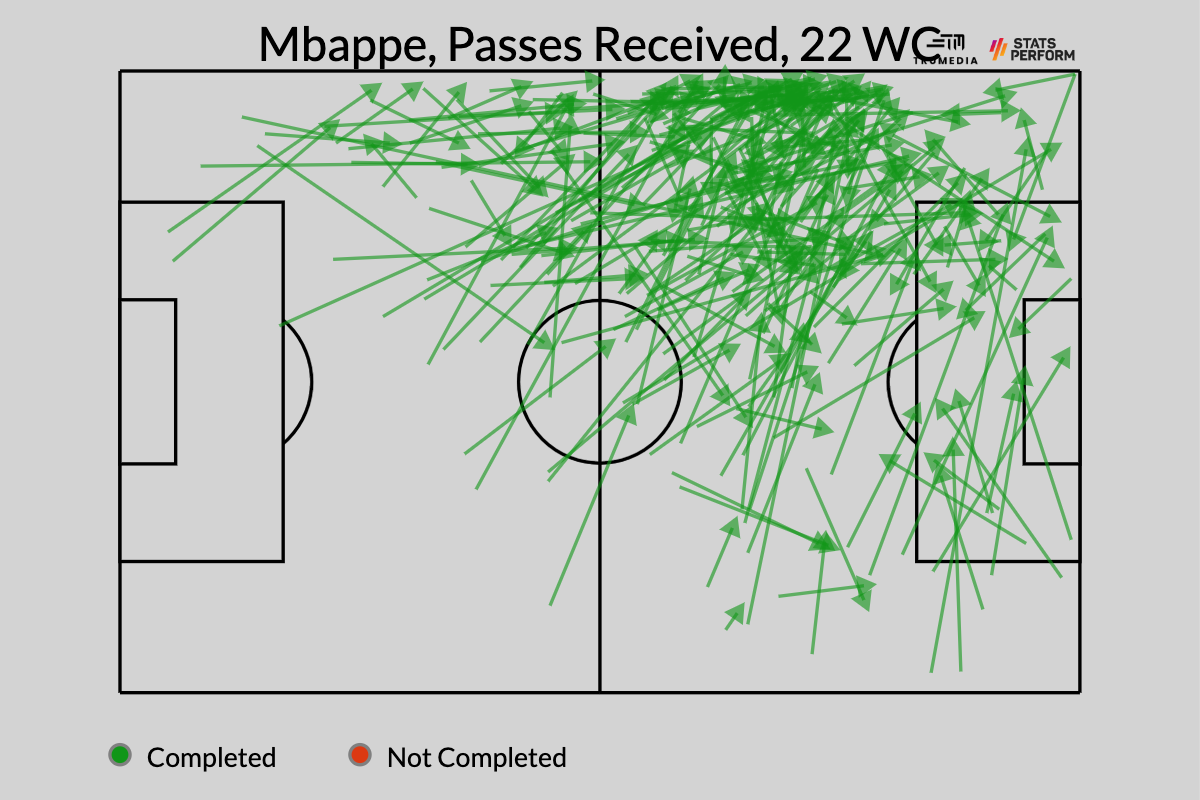
He also, you know, became the second-ever player to score a hat trick in a World Cup final. He won the Golden Boot and became the first player to score eight goals in a tournament since Ronaldo did it for Brazil in 2002. He's the fifth player to score in multiple World Cup finals and at 23, he has already scored more World Cup final goals than any player in the history of the sport. But all of that scoring? None of it happens without everything he does before the ball even touches his foot.
10
Let's quickly run through some of the records that Lionel Messi broke Sunday:
Most World Cup games played: 26
Most World Cup minutes played: 2,314
Most Golden Ball awards: 2
Most World Cup goal contributions: 21
Most FIFA Player of the Match awards in a single World Cup: 5
Most goals in major tournaments (World Cup/Euros/Copa América): 26
Messi is quite clearly the best soccer player ever -- and I think it's him and Usain Bolt in the conversation for the best athlete of all time. Of course, I thought that before the game Sunday, and nothing about it would've changed had they lost. Sunday was simply a culmination: a checking of the final box on a close-to-perfect career, the missing piece to an already-unsurpassed list of achievements.
But there was one other tiny detail that made it extra special.
Messi started out his career as a lively, dribbling winger; he first popped as a prospect because of how quickly and nimbly he was able to run with the ball. Then he became an unstoppable goalscoring winger, then he became the best false nine in the world, and then he became the best at, well, nearly every conceivable thing you can do with a soccer ball.
Forget the tactics; the best "tactic" in modern soccer was to let Messi touch the ball as many times as humanly possible. No gegenpressing or juego de posicion could ever match the creative magic inside of Messi's boots.
Unlike Mbappe, Messi does most of his damage with the ball. He famously walks more than almost any other player, though he even does that in an incredibly valuable way. But the value comes from Messi's ability to slink into space to continue to get on the ball, rather than stressing and then destroying the depth of the opposition's defensive line.
At the worst of times within the mess that was frequently the Argentine national team, this resulted in Messi dropping progressively deeper and receiving the ball far away from the opposition goal. What made the 2022 team work, though, is that he rarely had to do that. On Sunday, he scored twice and led all players in progressive passes (10), but he also led all players -- including Mbappe -- in progressive passes received (10).
Messi was, and still is, better at using a soccer ball than any other human being who has ever lived. He finally won the World Cup, though, when he showed us all that -- if he really wanted to -- he could've been just as dangerous without it.
